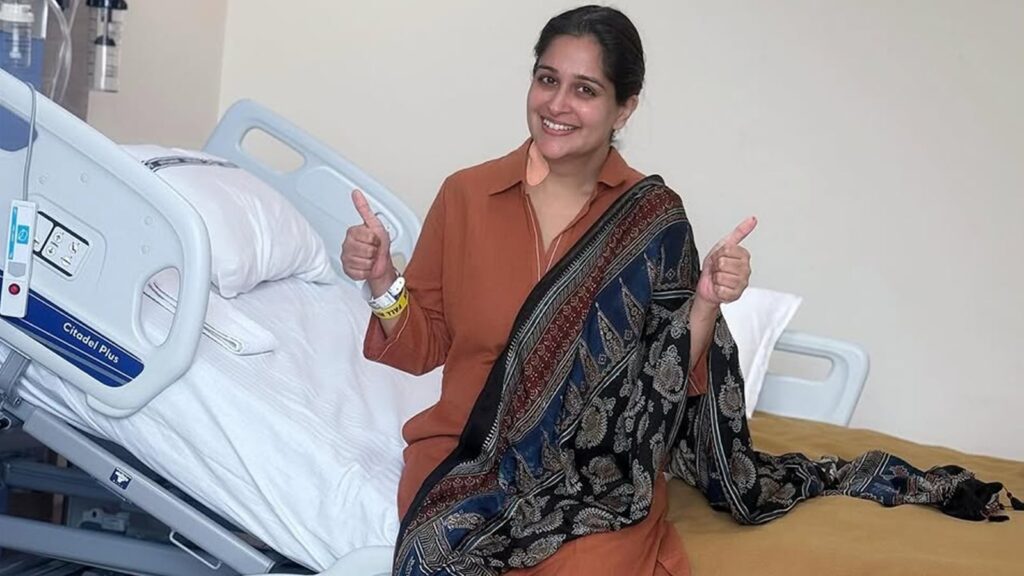970x125
Hair fall, skin rashes, ulcers, and unexpected reactions can sometimes appear when the body is undergoing certain medical treatments. Actor Dipika Kakar recently shared her experience after starting targeted therapy following surgery to remove a cancerous tumor from her liver in June.
970x125
In a vlog posted on her YouTube channel, she explained, “It has been more than a month taking tablets for targeted therapy, so we have to visit the doctor for follow-up. We have done a few blood tests and an ECG. I am feeling a little anxious. I feel like this now whenever I go to see a doctor related to this. I feel nervous, and maybe this will increase next month when we repeat my scan and tumour marker test.”
After her follow-up appointment, she noted, “I shared my concerns with the doctor. My ENT issues, ulcers, and rashes on the palm are all side effects of the medicine I am taking for targeted therapy. I have been given medicines to cure these side effects if the inflammation gets too much. I am also having hair fall due to the tablet. This side effect only occurs in 10 percent of people, and I am among them. But I have nothing to complain about, because the reason why the medicine is being taken is more important.”
She further added, “I pray that this medicine works well, and there are no more complications. Luckily, my blood reports and ECG are normal. My body is accepting the tablet well. There are just these minor side effects.”
We asked an expert to clarify why such symptoms can occur in patients undergoing targeted therapy.
Causes of hairfall in cases like targeted therapy
Dr Jagadish Hiremath, a public health intellectual, tells indianexpress.com, “Hair fall during targeted therapy occurs because the medicines, while acting on cancer cells, may also affect the normal cells responsible for hair growth. This is due to the impact of the treatment on the rapidly dividing cells in hair follicles. While targeted therapies are designed to be more selective than traditional chemotherapy, they can still influence these healthy cells in certain individuals.”
He adds, “Preventing hair fall entirely is challenging, but it can often be reduced with supportive measures such as using gentle hair care routines, avoiding heat styling, ensuring adequate nutrition, and in some cases, using topical treatments under medical supervision.”
How common are skin and mucosal side effects during targeted therapy?
Skin rashes on the palms and soles, as well as mouth ulcers, are relatively common side effects during targeted therapy. Dr Hiremath notes, “This happens because these medicines can trigger inflammation in the skin and mucous membranes, especially in areas exposed to friction or pressure. Most cases can be managed effectively without stopping treatment by using soothing moisturisers, avoiding harsh soaps or chemicals, applying medicated ointments, and using mouth rinses prescribed by the doctor.”
Story continues below this ad
What kinds of ear, nose, or throat symptoms can occur during such therapies?
Targeted therapies can sometimes lead to symptoms such as dryness of the mouth, changes in taste, nasal congestion, mild nosebleeds, sore throat, or ear discomfort. “These effects are usually manageable, but patients should pay close attention if they experience severe pain, persistent bleeding, sudden hearing changes, difficulty swallowing, or swelling in the throat. Such symptoms may indicate an infection, allergic reaction, or other complications that need immediate medical attention,” explains Dr Hiremath.
After targeted therapy, would you like to know more about precision therapy and how it is helping reduce cancer-related mortality by up to 98%? Read here.
DISCLAIMER: This article is based on information from the public domain and/or the experts we spoke to. Always consult your health practitioner before starting any routine.
970x125

